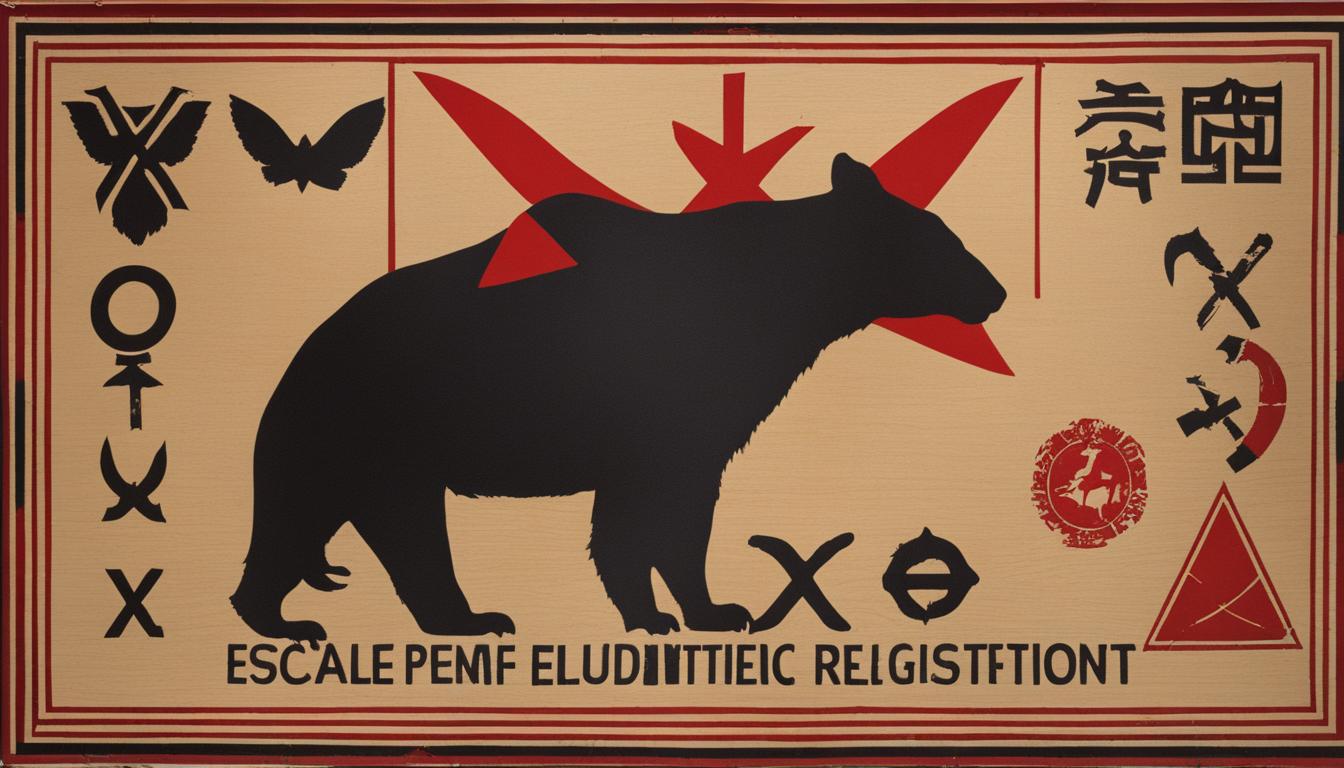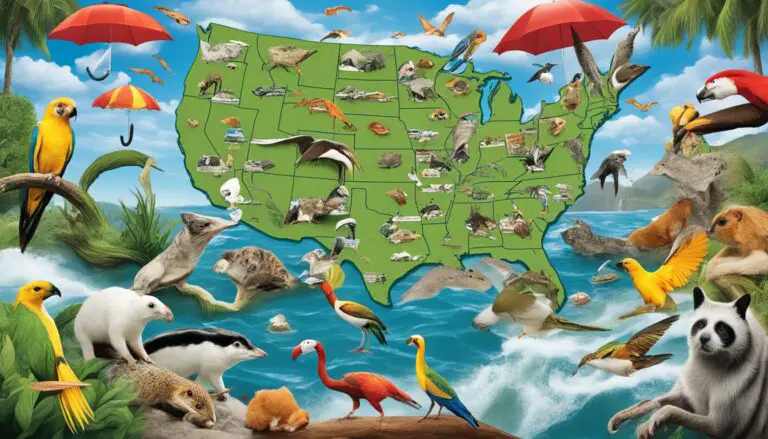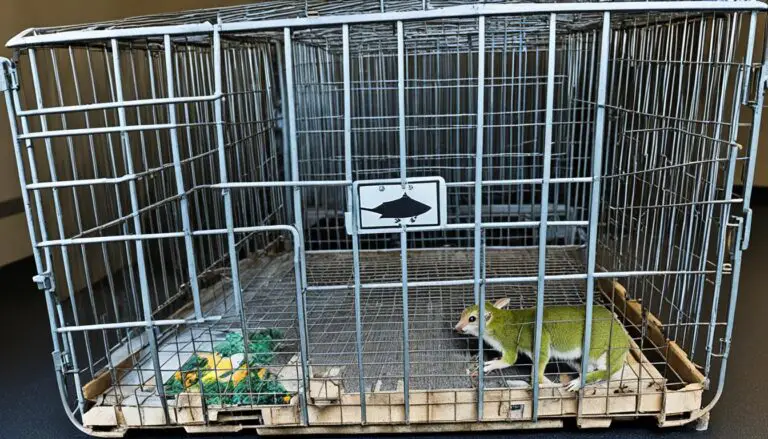Exotic Pet Welfare Laws in the US Explained
Exotic pet ownership in the United States is regulated by a combination of federal, state, and local laws. These laws aim to ensure the welfare and protection of exotic animals, as well as the safety of the public. It is important for exotic pet owners to understand and comply with these laws to provide humane care for their animals and avoid legal issues.
The regulations vary from state to state, and they cover a wide range of species and ownership requirements. State laws may include bans on certain animals, licensing or permitting processes, and restrictions on ownership. It is crucial for potential exotic pet owners to research and familiarize themselves with the specific laws in their state to ensure they are following the proper guidelines for caring for their pets.
Key Takeaways:
- Exotic pet ownership in the US is governed by a combination of federal, state, and local laws.
- These laws aim to protect the welfare of exotic animals and ensure public safety.
- State laws vary and may include bans, licensing processes, and ownership restrictions.
- Researching and understanding state-specific laws is essential for potential exotic pet owners.
- Compliance with the regulations is crucial to provide proper care for exotic pets and avoid legal issues.
Federal Laws and Their Implications
While most regulations on exotic pet ownership come from the state level, there are a few federal laws that have an impact on private ownership of exotic animals. One such law is the Lacey Act, which prohibits the transport and trade of certain species across state lines. This law helps prevent the illegal trade and trafficking of exotic animals. Another federal law that affects exotic pet ownership is the Animal Welfare Act, which sets standards for the care and handling of animals used in research, exhibition, and commercial purposes. While these laws primarily focus on commercial activities, they indirectly impact private ownership of exotic animals by regulating their transport and ensuring their welfare in certain settings.
It is important for prospective exotic pet owners to be aware of these federal laws and their implications. Understanding the regulations for owning exotic animals, including the transport laws, can help individuals navigate the complex landscape of exotic pet ownership. By complying with these federal laws, pet owners can contribute to the overall welfare and protection of exotic animals, ensuring their well-being in both commercial and private settings.
| Federal Laws on Exotic Pets | Regulations for Owning Exotic Animals | Exotic Animal Transport Laws | Impact of Federal Laws on Private Ownership of Exotic Animals |
|---|---|---|---|
| The Lacey Act | Setting standards for the care and handling of animals used in research, exhibition, and commercial purposes. | Prohibiting the transport and trade of certain species across state lines. | Ensuring the welfare of exotic animals in both commercial and private settings. |
| The Animal Welfare Act | Preventing the illegal trade and trafficking of exotic animals. |
State Laws and Regulations
When it comes to the ownership of exotic pets, state laws are the primary source of regulations. These laws govern various aspects of private possession of exotic animals, including bans, licensing requirements, and regulatory schemes. However, it is essential to note that the specific laws and regulations can vary significantly from one state to another.
Some states have adopted stringent measures by implementing complete bans on private ownership of certain exotic animals. These bans aim to protect both the animals and the general public. For example, California has banned private possession of specific species, such as big cats (e.g., lions, tigers, leopards) and primates (e.g., chimps, gorillas, monkeys), due to the potential risks they pose.
On the other hand, certain states maintain partial bans, allowing the ownership of certain species while restricting others. For instance, Florida prohibits the private possession of Class I animals (e.g., chimpanzees, crocodiles) but permits the ownership of Class II animals (e.g., lemurs, wallabies) with a permit.
Moreover, licensing requirements play a crucial role in regulating exotic pet ownership in many states. Exotic pet owners are required to obtain licenses or permits to possess certain species privately. These permits are typically issued by state wildlife agencies or similar authorities. For example, in Texas, individuals who want to keep dangerous wild animals like lions, tigers, or bears must obtain a Wildlife Possession Permit.
It is important for individuals interested in owning an exotic pet to research the laws in their state thoroughly. By doing so, they can determine which species are allowed, what permits or licenses are required, and what guidelines must be followed to ensure compliance with the law. Adhering to these regulations is crucial to prevent legal issues and ensure the well-being of both the exotic animals and the public.
Local Regulations and Enforcement
In addition to federal and state laws, exotic pet ownership is also regulated by local regulations at the city or county level. These regulations serve to govern the ownership and care of exotic pets and can vary greatly from one locality to another.
Local regulations can range from restrictions on certain species to licensing or permitting requirements for exotic pet ownership. Some areas may have stricter rules in place, while others may have more lenient regulations. It is essential for prospective exotic pet owners to be aware of and adhere to the local regulations that apply to them.
“It is important for prospective exotic pet owners to be aware of any local regulations that may apply to them.”
Enforcement of these laws is typically carried out by local authorities, such as animal control or wildlife departments. These agencies are responsible for ensuring compliance with the local regulations and addressing any violations that may occur.
Violating local regulations for exotic pet ownership can have serious consequences. Penalties for non-compliance may include fines, permits or licenses being revoked, or even the confiscation of the animal. It is crucial for exotic pet owners to understand and abide by the local regulations to avoid legal complications and to ensure the well-being of their pets.
“Violating these regulations can result in penalties, including fines and even confiscation of the animal.”
By following the local regulations and being responsible pet owners, individuals can contribute to the overall welfare and protection of exotic animals. It is important to be proactive in advocating for comprehensive laws that prioritize the well-being of these unique and often misunderstood creatures.
Conclusion
Exotic pet welfare laws in the United States play a vital role in protecting these unique creatures and ensuring the safety of the public. These laws, which encompass federal, state, and local regulations, cover a wide range of species and ownership requirements.
Prospective exotic pet owners must take the time to thoroughly research and understand these laws in their respective states and local areas. By doing so, they can ensure responsible and legal ownership of their pets, promoting their well-being and overall welfare.
It is equally important to advocate for the rights and welfare of exotic animals. By supporting comprehensive protection measures, we can contribute to their well-being and challenge common misconceptions about exotic pets. Responsible ownership and advocacy go hand in hand to improve the lives of these fascinating animals.
Let us all strive to follow the laws, provide loving and proper care to our exotic pets, and advocate for their rights. Together, we can make a difference in the protection and well-being of exotic pets in the United States.
FAQ
What laws govern exotic pet ownership in the United States?
Exotic pet ownership in the United States is regulated by a combination of federal, state, and local laws.
What do these laws aim to achieve?
These laws aim to ensure the welfare and protection of exotic animals, as well as the safety of the public.
Are there federal laws that impact private ownership of exotic animals?
Yes, federal laws such as the Lacey Act and the Animal Welfare Act have an impact on private ownership of exotic animals.
What are state laws on exotic pet ownership?
State laws on exotic pet ownership vary, including bans on certain animals, licensing or permitting processes, and ownership restrictions.
Do local regulations also govern exotic pet ownership?
Yes, local regulations at the city or county level may govern exotic pet ownership and can vary greatly.
How can I ensure I am legally caring for my exotic pet?
Research and familiarize yourself with the specific laws in your state and local area to ensure compliance and responsible ownership.
What are the penalties for violating exotic pet regulations?
Violating exotic pet regulations can result in penalties such as fines and confiscation of the animal.
How can I contribute to the welfare of exotic pets?
By following the laws, providing proper care, and advocating for their rights, you can contribute to the welfare of exotic pets in the United States.
Source Links
- https://www.animallaw.info/article/detailed-discussion-exotic-pet-laws-update
- https://www.bornfreeusa.org/campaigns/animals-in-captivity/summary-state-laws-exotic-animals/
- https://www.animallaw.info/intro/exotic-pet-laws
Peter Stones is the founder of Exotic Pets Place, the leading online resource for exotic pet care information.
With over 10 years of hands-on exotic pet ownership experience, he is deeply passionate about sharing his expertise to help others properly care for their unusual pets.
When he's not writing extensively researched articles or connecting with fellow exotic pet enthusiasts worldwide, you can find Peter at home tending to his own beloved menagerie of exotic animals.







